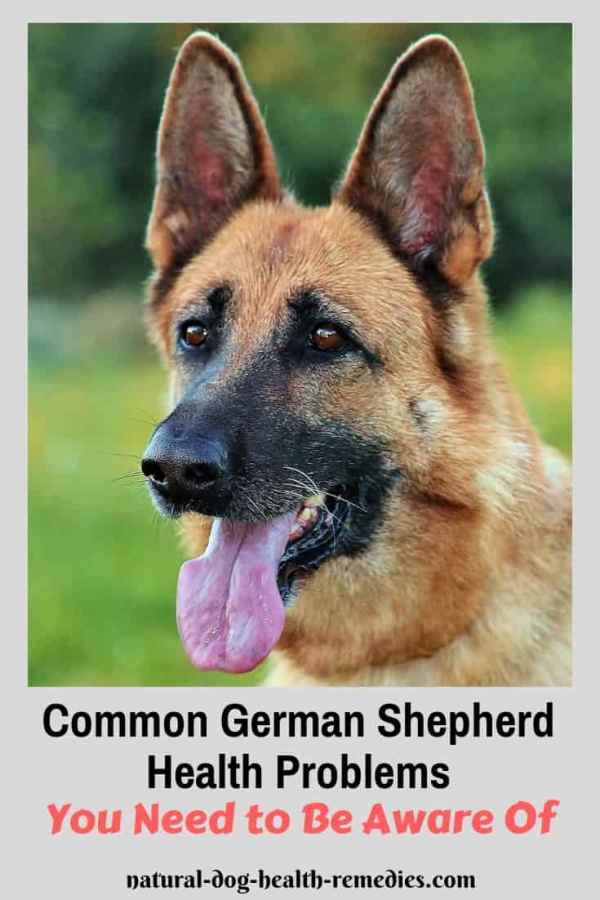German Shepherd Health Problems

German Shepherd Facts
The German Shepherd is strong, muscular, loyal, and intelligent. German Shepherds are not only excellent companion dogs, but also very competent working dogs. They excel in being guide dogs, police dogs, tracking dogs, to name just a few.
The German Shepherd is one of the most popular breeds in the U.S.A.- Ranked 2nd most registered breed by the AKC for 2017.
German Shepherd Life Span
The average lifespan of a German Shepherd is from 9 to 13 years.
Unfortunately, German Shepherds are susceptible to certain health problems, some of these problems are common among large breed dogs.
German Shepherd Health Problems
Related to the Joints
As a large breed dog, the German Shepherd has several health problems that affect their joints, such as:
- Hip Dysplasia: A dog with hip dysplasia has a deformed hip joint. In many cases, the hip socket is too shallow to fully and firmly hold the ball-shaped thighbone. Sometimes, it also means that the muscles, ligament, and connective tissue surrounding the joint may not be strong enough to hold the "ball and socket" together.
Hip dysplasia in dogs can cause a lot of pain (and inflammation) in the affected hip joint, and the dog will have problem walking and getting up with ease.
Visit our article on Hip Dysplasia in Dogs for more information on this joint problem in dogs.
- Elbow Dysplasia: Osteochondritis of the elbow (elbow dysplasia) is a hereditary disease (but may also be caused by poor nutrition or injury).
 This problem is characterized by the elbow joints of the front legs being malformed, due probably to different growth rates of the three bones making up the elbow.
This problem is characterized by the elbow joints of the front legs being malformed, due probably to different growth rates of the three bones making up the elbow.Dogs with this condition usually display an obvious limp - they may hold the leg out from the body while walking, or even attempt to carry the front leg completely, putting no weight on it at all. Signs may be noted as early as four months of age.
Elbow dysplasia is a lifelong problem, although some dogs can be helped with surgery which, in some cases, can eliminate the problem totally.
- Panosteitis: Panosteitis (also known as "long bone disease," or "pano") is a health condition that commonly affects German Shepherd dogs who are still growing.
It causes sudden lameness which is a result of excessive bone production on the long bones of the front and hind legs, causing inflammation. It is most commonly seen in dogs between the ages of five to 12 months.
Usually a dog affected by this condition will grow out of the problem by 18 months old, but it is painful.
Puppies on a high-protein diet are prone to pano, because this kind of diet makes the puppy grow too fast.
German Shepherd Health Problems
Related to the Nervous System
These two German Shepherd health problems are connected with the nervous system, and can cause a lot of hardship to the dog:
- Epilepsy: Epilepsy is a chronic condition characterized by recurrent seizures. Epilepsy is one of the most common German Shepherd health problems.
- Degenerative Myelopathy: Degenerative Myelopathy (DM) is relatively frequent in the German Shepherd breed. The age at onset is 5 to 14 years.
DM is an autoimmune disease in which the dog's own immune system attacks his central nervous system. As a result, the dog suffers from progressive neural tissue damage.
At its early stage, the dog's hind limbs will be affected - the muscles will be weakened and you can notice a loss of coordination in the hind limbs.
As the disease progresses, the dog may also display symptoms such as incontinence, has considerable difficulties with both balance and walking, and eventual paralysis.
The treatment of DM involves exercise, dietary supplementation, medication, and other supportive measures.
Other German Shepherd Health Problems
Other common health problems found in GSDs include:
- Bloating: Bloating is a common health issue that large breed dogs like German Shepherds are prone to. Bloating in dogs could be life-threatening and prone veterinary attention is needed. If your GSD is prone to this problem, be sure to read our article on dog bloating for more information.
- Perianal Fistulas: Perianal fistulas are chronic and progressive lesions that occur around the anus in dogs. German Shepherds are particularly prone to this disease (84% of the dogs diagnosed are German Shepherds).
Perianal fistulas most commonly occur in middle-aged (5-8 years old) male dogs, but can occur in dogs as young as 1 year and as old as 14 years.
The exact cause of this condition is unclear. It is believed that inflammation of the sweat and sebaceous glands in and around the anus causes infection. As a result, abscesses form, open, and then drain.
Dogs with tails that set low and carried close to the body (e.g. German Shepherds) are prone to these fistulas because air does not circulate under the tail, making it an excellent environment for bacteria to multiply.
Symptoms of this condition include constant chewing or licking of the perianal area, and scooting across the floor. Other symptoms may include constipation, diarrhea, or bloodly stool. Ulcers and bleeding may be seen around the anal area, as well as foul-smelling discharge.
- von Willebrand's Disease (vWD): vWD is a common inherited blood disorder, characterized by a deficiency in clotting factor VIII antigen. Therefore, excessive bleeding is a hallmark symptom of this disease, which afflicts German Shepherds quite often.
Dogs affected by this disease are more likely to have excessive bleeding episodes upon injury. The dog may also develop nosebleeds or bleeding from the gums. Some dogs may have internal organ bleeding (e.g. the stomach or intestine), and you may see blood in their urine.
Health Supplements for German Shepherds

Recommendations for Your German Shepherd!
This supplement contains glucosamine and MSM and is effective in supporting mobility and joint health in dogs.
Doc Ackerman's Epilepsy & Seizure Formula for Dogs and Cats
This is an effective herbal formula that contains nerve-calming and nourishing herbs such as chamomile, ginseng, passion flower, St.-John's wort, valerian root, etc. It greatly helps dogs with epilepsy.
Furminator De-shedding Tool
German Shepherds have dense coats that shed throughout the year, with increased shedding once or twice a year. This excellent tool helps to control shedding by removing (not cutting) the loose and dead undercoat hair that is the underlying source of shedding. The stainless steel edge grabs and removes the loose undercoat hair without damaging the topcoat. Highly recommended!
American Kennel Club
PetCoach.com
The Neurology Serice at Veterinary Medical Teaching Hospital, University of Flordia (neuro.vetmed.ufl.edu/neuro/DM_Web/DMofGS.htm)





